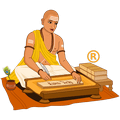























Sunrise07:39
Sunset18:24
Moonrise07:46
Moonset18:17
Shaka Samvat-0085 Pramadi
Vikram Samvat0050 Shobhakrit
Gujarati Samvat0050 Krodhana
Amanta MonthMagha
Purnimanta MonthPhalguna
WeekdayShukrawara
PakshaKrishna Paksha
TithiAmavasya upto 16:49
NakshatraShatabhisha upto 06:37, Jan 29
YogaShiva upto 18:30
KaranaNagava upto 16:49
KaranaKinstughna upto 05:26, Jan 29
Pravishte/Gate14
Rahu Kalam11:41 to 13:02
Gulikai Kalam09:00 to 10:20
Yamaganda15:43 to 17:04
Abhijit12:40 to 13:23
Dur Muhurtam09:48 to 10:31
Dur Muhurtam13:23 to 14:06
Amrit Kalam22:55 to 00:38, Jan 29
Varjyam12:38 to 14:21
Notes: All timings are represented in 24-hour notation in local time of New Delhi, India with DST adjustment (if applicable).
Hours which are past midnight are suffixed with next day date. In Panchang day starts and ends with sunrise.


 Meena
Meena U Bhadrapada 11:15
U Bhadrapada 11:15

 Dhanu 25:35+
Dhanu 25:35+ P Ashadha 19:36
P Ashadha 19:36

 Makara
Makara U Ashadha 19:42
U Ashadha 19:42

 Kumbha
Kumbha Shatabhisha 22:50
Shatabhisha 22:50

 Kumbha 18:22
Kumbha 18:22 P Bhadrapada 24:57+
P Bhadrapada 24:57+

 Meena 30:28+
Meena 30:28+ Revati 30:28+
Revati 30:28+

 Mesha
Mesha Ashwini
Ashwini

 Mesha 19:12
Mesha 19:12 Bharani 12:30
Bharani 12:30

 Vrishabha
Vrishabha Krittika 15:07
Krittika 15:07

 Vrishabha 29:55+
Vrishabha 29:55+ Rohini 17:10
Rohini 17:10

 Mithuna 12:57
Mithuna 12:57 Punarvasu 18:49
Punarvasu 18:49

 Simha 17:57
Simha 17:57 P Phalguni 12:29
P Phalguni 12:29

 Kanya 19:14
Kanya 19:14 Hasta 08:13
Hasta 08:13

 Tula
Tula Swati 28:43+
Swati 28:43+

 Tula 21:44
Tula 21:44 Vishakha 27:28+
Vishakha 27:28+

 Vrishchika
Vrishchika Anuradha 26:35+
Anuradha 26:35+

 Vrishchika 26:05+
Vrishchika 26:05+ Jyeshtha 26:05+
Jyeshtha 26:05+

 Dhanu
Dhanu Mula 25:56+
Mula 25:56+

 Makara 16:14
Makara 16:14 Dhanishtha 28:56+
Dhanishtha 28:56+In Hindu Calendar, the day starts with local sunrise and ends with next day local sunrise. As sunrise time is different for all cities, Hindu Calendar made for one city is not valid for any other city. Hence it is important to use location based Hindu Calendar, like this website. Further, each Hindu day consists of five elements, which are called angas. These five elements are -
In Hindu Calendar, all five elements together are called Panchang. (In Sanskrit: Panchang = Pancha (five) + Ang (part)). Hence Hindu Calendar which shows all five elements for each day is called Panchang. In South India Panchang is known as Panchangam.
When Hindu Calendar includes Muslims, Sikh, Christian, Buddhist and Jain festivals, including national holidays, it is called as Indian Calendar.